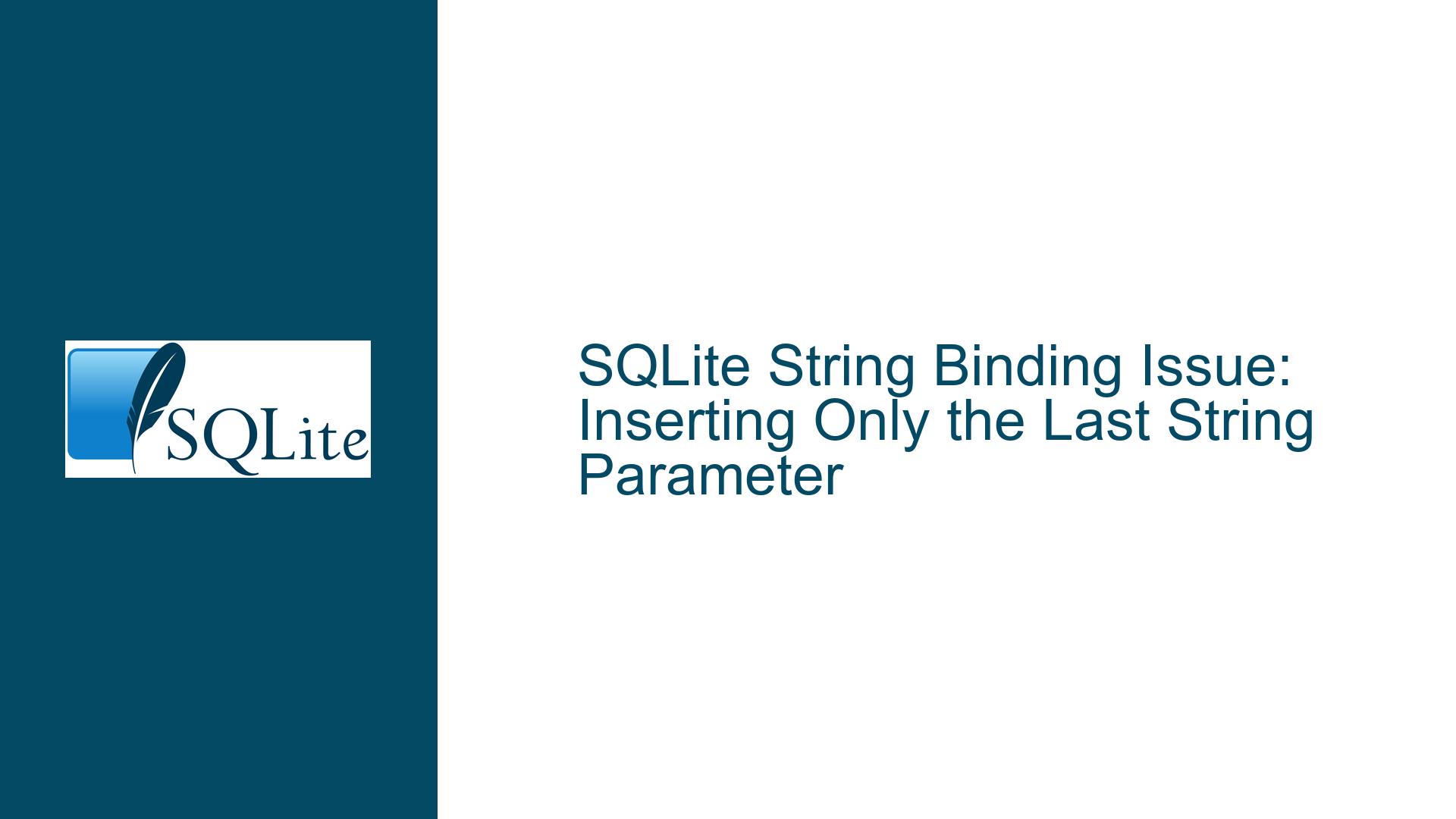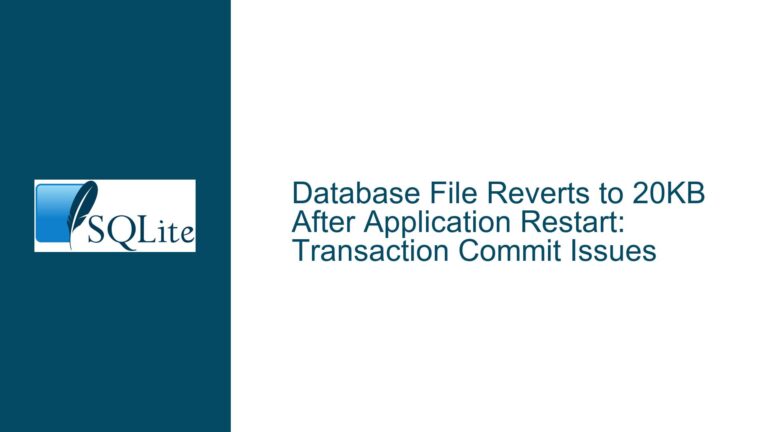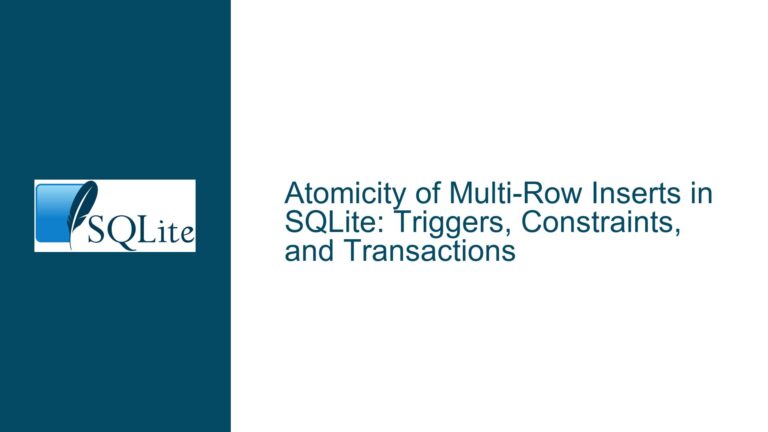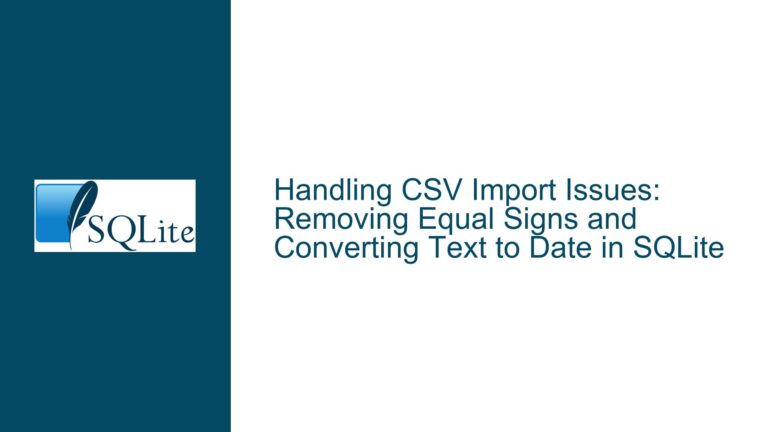SQLite String Binding Issue: Inserting Only the Last String Parameter
Understanding the sqlite3_bind_text Behavior with Temporary Strings
The core issue revolves around the misuse of the sqlite3_bind_text function in SQLite, specifically when binding string parameters to a prepared statement. The problem manifests when multiple string parameters are bound, but only the last string parameter’s value is inserted into the database for all string fields. This behavior is not due to a bug in SQLite but rather a misunderstanding of how sqlite3_bind_text handles string lifetimes and memory management.
When using sqlite3_bind_text, the function expects a pointer to a C-style string (a null-terminated character array) and an optional length. The final parameter of sqlite3_bind_text is a destructor callback that determines how SQLite should handle the memory of the string. If this parameter is set to nullptr, SQLite assumes that the string is static or long-lived and will not copy or free the memory. However, if the string is temporary (e.g., a std::string‘s internal buffer), its memory may be invalidated before SQLite uses it, leading to undefined behavior.
In the described scenario, the issue arises because the c_str() method of std::string returns a pointer to a temporary buffer. When nullptr is passed as the destructor parameter, SQLite does not copy the string, and by the time sqlite3_step is called, the temporary string has been destroyed, leaving SQLite with a dangling pointer. This results in all string parameters being populated with the value of the last string, as its memory happens to be the only valid one at the time of execution.
The Role of Temporary String Lifetimes in SQLite Binding
The root cause of the issue lies in the interaction between C++’s std::string and SQLite’s sqlite3_bind_text function. In C++, std::string::c_str() returns a pointer to an internal buffer that is valid only for the lifetime of the std::string object. If the std::string object is temporary (e.g., created as part of a function call or expression), its lifetime ends immediately after the expression is evaluated. This means that the pointer returned by c_str() becomes invalid as soon as the temporary std::string is destroyed.
When sqlite3_bind_text is called with nullptr as the destructor parameter, SQLite assumes that the provided string pointer will remain valid for the duration of the database operation. However, if the string is temporary, this assumption is incorrect, and SQLite ends up using invalid memory. This explains why the last string parameter’s value appears for all string fields: its memory happens to be the only one still valid at the time of execution.
To avoid this issue, it is crucial to ensure that the strings passed to sqlite3_bind_text remain valid for the duration of the database operation. This can be achieved by either using long-lived strings (e.g., std::string objects that persist until the database operation is complete) or by instructing SQLite to copy the string using the SQLITE_TRANSIENT flag.
Correcting the Issue with SQLITE_TRANSIENT and Proper String Management
The solution to the problem involves two key changes: using the SQLITE_TRANSIENT flag and ensuring proper string management. The SQLITE_TRANSIENT flag tells SQLite that the provided string is temporary and should be copied internally. This ensures that SQLite has its own copy of the string, which remains valid even if the original string is destroyed.
Here is the corrected code snippet:
sqlite3_bind_text(stmt, i+1, params->at(i).getAsString().c_str(), params->at(i).getAsString().length(), SQLITE_TRANSIENT);
By replacing nullptr with SQLITE_TRANSIENT, SQLite will copy the string and manage its memory internally. This eliminates the issue of dangling pointers and ensures that each string parameter is inserted correctly.
Additionally, it is important to ensure that the std::vector containing the parameters is properly populated and that the getAsString() method returns valid std::string objects. If getAsString() returns temporary strings, they should be stored in a long-lived container (e.g., a std::vector<std::string>) to ensure their validity throughout the database operation.
Best Practices for Binding Strings in SQLite
To avoid similar issues in the future, follow these best practices when binding strings in SQLite:
Use
SQLITE_TRANSIENTfor Temporary Strings: Always useSQLITE_TRANSIENTwhen binding temporary strings (e.g., strings returned bystd::string::c_str()). This ensures that SQLite copies the string and manages its memory internally.Ensure String Validity: If you are using long-lived strings, ensure that they remain valid for the duration of the database operation. Avoid using temporary strings unless absolutely necessary.
Avoid Unnecessary String Copies: If you are working with long-lived strings, consider using
SQLITE_STATICinstead ofSQLITE_TRANSIENTto avoid unnecessary memory copies. However, this requires careful management of string lifetimes.Debugging String Binding Issues: If you encounter issues with string binding, use debugging tools to inspect the memory addresses and contents of the strings being bound. This can help identify issues with temporary strings or invalid memory.
Consistent Parameter Management: Ensure that all parameters (strings, numbers, etc.) are managed consistently. Use a single approach for binding parameters to avoid confusion and potential issues.
By following these best practices, you can avoid common pitfalls when working with string binding in SQLite and ensure that your database operations are reliable and efficient.
Advanced Considerations: Memory Management and Performance
While the immediate issue is resolved by using SQLITE_TRANSIENT, it is worth considering the broader implications of memory management and performance when working with SQLite. Copying strings internally can have a performance impact, especially when dealing with large datasets or frequent database operations. Therefore, it is important to balance the need for correct behavior with the desire for optimal performance.
One approach to minimizing memory copies is to use long-lived strings and SQLITE_STATIC where possible. This requires careful management of string lifetimes but can reduce the overhead associated with copying strings. Another approach is to use prepared statements and parameter binding efficiently, ensuring that strings are bound only when necessary and reused where possible.
Additionally, consider the use of connection pooling and other performance optimization techniques to reduce the overhead of database operations. By combining proper string management with performance optimization, you can achieve both correctness and efficiency in your SQLite applications.
Conclusion
The issue of sqlite3_bind_text inserting only the last string parameter is a common pitfall when working with temporary strings in SQLite. By understanding the role of string lifetimes and memory management, and by using the SQLITE_TRANSIENT flag, you can ensure that string parameters are bound correctly and reliably. Additionally, following best practices for string binding and memory management can help you avoid similar issues in the future and optimize the performance of your SQLite applications.
In summary, the key takeaways are:
- Use
SQLITE_TRANSIENTfor temporary strings to ensure proper memory management. - Ensure that strings remain valid for the duration of the database operation.
- Follow best practices for string binding and parameter management to avoid common pitfalls.
- Balance correctness with performance by minimizing unnecessary memory copies and optimizing database operations.
By applying these principles, you can confidently work with string binding in SQLite and build robust, efficient database applications.






